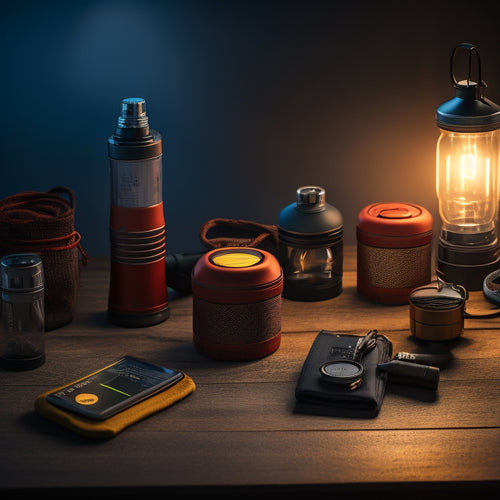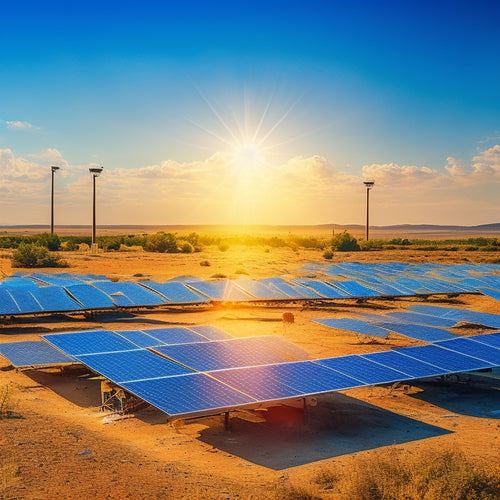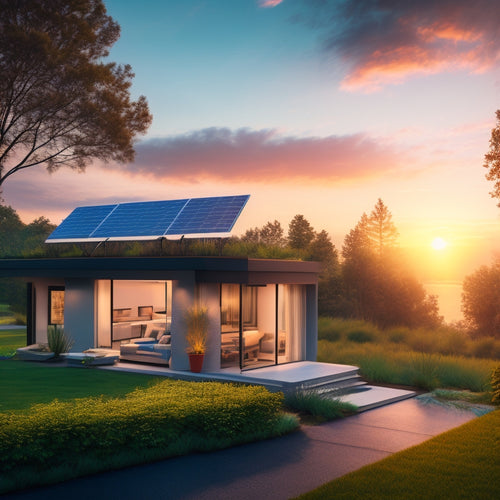
Home Energy Storage Solutions
Share
You're looking for a reliable way to power your home during outages while reducing your environmental impact and enhancing your property's value. Home energy storage solutions can provide seamless backup power, ensuring your comfort and safety during grid failures. By integrating with solar batteries, you can store excess energy for emergencies. To get the most out of your system, it's essential to understand your daily energy usage patterns, optimize your inverter's conversion efficiency, and select a lithium-ion battery with a high cycle life. As you investigate your options, you'll uncover how these solutions can improve your energy independence, savings, and property appeal - and there's more to reveal.
The Essentials
- Home energy storage systems provide reliable backup power during grid failures, ensuring comfort and safety for households with essential medical equipment.
- Integration with solar batteries allows for storing excess energy for emergencies, and energy management systems enable monitoring and optimization of energy usage.
- Investing in home energy storage solutions can increase property value and resale potential by up to 10%, providing a significant return on investment.
- Understanding daily energy usage patterns is crucial for selecting the ideal home energy storage solution, as it helps identify peak usage periods and optimize energy management.
- Cycle life and proper maintenance are key factors in extending the lifespan and performance of lithium-ion batteries in home energy storage systems.
Backup Power During Outages
When the grid goes down, you need a reliable energy supply to keep your lights on and critical appliances running.
With a home energy storage system, you'll have power when you need it most, ensuring your family's comfort and safety.
This is especially important for households with life-saving medical equipment that require a constant power supply.
Power When You Need
How do you stay energized when the grid goes down? With a home energy storage system, you can rest assured that you'll have power when you require it most. During outages, your system kicks in, providing a seamless shift to backup power. This is especially vital for households with critical medical equipment, refrigeration, or communication devices.
By integrating a high-quality house solar battery, such as the Tesla Powerwall, you can store excess energy generated by your solar panels and use it during off-peak hours or emergencies. When integrating renewable energy sources like solar or wind, your home energy storage system guarantees a stable and efficient supply of power.
System compatibility is key, as it enables your storage system to work in harmony with your renewable sources, grid connection, and household appliances. This integration allows you to maximize your renewable energy generation and reduce your reliance on the grid.
With a home energy storage system, you're not only prepared for outages but also enabled to take control of your energy usage. You can monitor your energy production and consumption, optimize your system's performance, and make data-driven decisions to reduce your energy costs.
Reliable Energy Supply
Your home energy storage system becomes a reliable energy supply when the grid fails, providing backup power during outages. This means you can maintain energy independence and reduce your grid reliance, even when the utility company can't provide power.
With a reliable energy supply, you can continue living sustainably, powering your smart home with renewable integration and advanced battery technology. By investing in a home battery backup system, you can safeguard your family's comfort and avoid costly losses due to food spoilage and damage to electronics.
During outages, your energy storage system takes over, ensuring a seamless shift to backup power. This not only provides convenience but also helps you avoid the financial and environmental impact of spoiled food and property damage.
With energy management systems in place, you can optimize your energy usage and reduce your reliance on the grid, resulting in cost savings and a lower environmental footprint.
Increases Property Value Significantly
By installing a home energy storage solution, you'll greatly enhance your property's resale value, making it more attractive to potential buyers.
In fact, a study has shown that homes with energy storage systems like Tesla Powerwall and LG Chem RESU can increase their value by up to 10%.
This increased appeal directly translates to a higher selling price, resulting in a substantial return on investment.
Additionally, your energy storage system becomes an important asset, increasing your property's overall worth.
Boosts Resale Value
A modern home equipped with a home energy storage system can be a major selling point, greatly enhancing its resale worth.
You'll reap the benefits of energy independence, and potential buyers will be attracted to the smart investments you've made in your property.
A home energy storage system is a significant asset that sets your home apart from others on the market.
It's a unique selling feature that can justify a higher asking price, giving you a competitive edge when it's time to sell.
Increases Asset Worth
Installing a home energy storage system greatly increases your property's value, making it a highly desirable asset. This increase in value is attributed to the various benefits that come with energy independence. With a home energy storage system, you're no longer reliant on the grid, reducing your environmental impact and energy bills.
In addition, financial incentives such as tax credits and rebates can offset the installation costs, making it a savvy investment. As technology advancements continue to improve grid integration, your system will be able to seamlessly interact with the grid, providing a reliable source of backup power during outages.
Moreover, maintenance costs are considerably lower compared to traditional energy sources, and installation considerations are becoming more streamlined. The enhanced user experience, combined with the rising market trends towards sustainable living, will certainly increase your property's value.
Regulatory structures are also changing to support the adoption of home energy storage systems, providing a clear path forward for homeowners looking to invest in their property's future. By installing a home energy storage system, you're not only increasing your property's value but also contributing to a more sustainable future.
Inverter Conversion Efficiency Matters
When selecting an inverter for your home energy storage system, you'll want to prioritize peak power output, which is essential for efficiently charging and discharging your battery bank.
Inverters play a vital role in off-grid energy storage systems, which often rely on deep cycle battery technology to store excess energy generated by solar panels.
Inverter conversion efficiency matters because it directly impacts energy loss minimization, and even a small percentage of wasted energy can add up over time.
Peak Power Output
Your home energy storage system's peak power output is vital for handling high-energy demand periods, such as when you're running multiple appliances simultaneously. During peak demand, your system must be able to supply power quickly and efficiently to prevent energy shortages. This is where energy management and load balancing come into play, ensuring that your system allocates power effectively to meet your energy needs.
Achieving grid independence requires a system that can integrate seamlessly with renewable energy sources, such as solar or wind power. Advanced battery technology and smart systems enable your home energy storage system to optimize energy usage and reduce waste.
Efficiency upgrades and sustainability practices are significant in minimizing your carbon footprint. Furthermore, a scalable system allows you to expand or modify your energy storage capacity as your energy needs change.
Energy Loss Minimization
As you prioritize peak power output, you must also consider the efficiency of your home energy storage system's inverter conversion process. Inverter conversion efficiency is critical in minimizing energy losses, which directly impact your energy efficiency, cost savings, and overall system performance.
| Inverter Efficiency | Energy Loss | Grid Independence Impact |
|---|---|---|
| 90% | 10% | Reduced battery lifespan, increased grid reliance |
| 95% | 5% | Moderate energy waste, slight grid dependence |
| 98% | 2% | Maximum energy utilization, increased grid independence |
| 99% | 1% | Near-lossless energy transmission, enhanced renewable integration |
| 100% | 0% | Ideal energy efficiency, complete grid independence |
Assess Your Daily Power Needs
You need to understand your daily energy usage patterns to determine the right home energy storage solution for your needs, especially when considering solar battery storage to reduce your reliance on the grid.
By analyzing your energy usage patterns and average power consumption rate, you can identify the peak periods of energy demand and size your energy storage system accordingly, which can help you solve power outages and lower your utility bills.
To do this, you'll want to calculate your average power consumption rate, which is the amount of electricity your home uses at any given time.
Daily Energy Usage Patterns
Understanding daily energy usage patterns is vital to determining the ideal home energy storage solution. By analyzing your daily energy consumption trends, you can identify peak usage periods and optimize your energy demand forecasting. This enables you to take advantage of off-peak hours when energy rates are lower, reducing your overall energy costs.
A thorough daily usage analysis helps you pinpoint areas for efficiency optimization strategies, ensuring you're using energy wisely. Your lifestyle impact assessment is significant in this process, as it reveals how your daily habits influence your energy consumption.
For instance, do you notice seasonal energy variations in your usage patterns? Have you experienced usage pattern shifts or consumption behavior changes over time? By recognizing these patterns, you can adjust your energy usage accordingly, maximizing the benefits of your home energy storage solution.
Average Power Consumption Rate
How much power does your home require on a daily basis? Understanding your average power consumption rate is vital in evaluating your daily power needs. This involves analyzing your energy usage patterns to determine the total amount of energy your home consumes daily.
A consumption rate analysis helps you identify the peak hours of energy usage, which appliances consume the most power, and the overall average energy consumption.
To determine your average power consumption rate, you'll need to calculate your total daily energy usage in kilowatt-hours (kWh). You can do this by reviewing your past electricity bills or using a smart plug to track the energy usage of individual appliances.
Once you have this data, you can calculate your average power consumption rate by dividing your total daily energy usage by the number of hours in a day. This will give you your average power consumption rate in kilowatts (kW).
Knowing your average power consumption rate is fundamental in selecting the right home energy storage solution, as it guarantees you have a system that can meet your daily power needs and provide the freedom you desire.
Lithium-Ion Batteries Last Longer
When choosing a lithium-ion battery for your home energy storage solution, you'll want to take into account its cycle life, as it directly impacts the battery's lifespan.
A higher cycle life means the battery can charge and discharge more times before its capacity starts to degrade.
Cycle Life Matters
Frequently, homeowners considering home energy storage solutions find themselves puzzled by the intricacies of battery performance. You're not alone in wondering what makes a battery last longer.
When it comes to lithium-ion batteries, cycle life matters. It's the number of charging cycles a battery can handle before its capacity degrades. You want a battery that can handle frequent charging and discharging without sacrificing performance. A battery with high cycle longevity means you'll get more bang for your buck.
Proper battery maintenance, such as regulating discharge rates and charging cycles, is essential for extending cycle life. Thermal management also plays a key role in preventing performance degradation.
When you choose a battery with advanced thermal management, you're reducing the environmental impact of your energy storage solution. With cost efficiency in mind, technology advancements have led to more efficient battery designs that prioritize user experience.
Look for a battery that strikes a balance between cycle life, cost, and environmental sustainability. By doing so, you'll enjoy the freedom to store and use energy on your own terms.
Frequently Asked Questions
Can I Install a Home Energy Storage System Myself?
You can attempt a DIY installation, but it's essential you understand the safety considerations involved, as improper connections can lead to electrical shock, fire hazards, or even system failure, putting your freedom and property at risk.
Are There Any Government Incentives for Energy Storage Systems?
As you chart your course towards energy independence, you'll find that Uncle Sam is willing to lend a hand, offering federal tax credits and state rebates to help you steer through the costs of energy storage systems, illuminating a path to liberty from the grid.
How Long Does It Take to Charge a Home Energy Storage System?
You'll find that charging speed depends on the system's power rating and your battery capacity - typically, a 10kWh battery takes 2-5 hours to fully charge with a 3kW charger, giving you the freedom to utilize energy on your terms.
Can I Use My Existing Electrical Panel With a Storage System?
You're wondering if your existing electrical panel is compatible with a new storage system. Generally, you can integrate a storage system with your existing panel, but it's essential to assess the panel's capacity and guarantee it can handle the added power flow.
Are Energy Storage Systems Safe for My Family and Pets?
You're right to question the safety of energy storage systems, as lithium-ion batteries can pose fire risks if not designed with safety standards in mind. Thankfully, manufacturers conduct thorough risk assessments to minimize hazards, ensuring a safe environment for you and your loved ones.
Final Thoughts
As you weigh your options for home energy storage solutions, consider this: investing in a high-efficiency system can literally be a lifesaver. During extended outages, your independence from the grid will be a guiding light of hope. And when the lights come back on, your property value will have increased considerably. Don't just take our word for it - research has shown that homes with energy storage systems sell for up to 10% more. Make the smart choice and secure your energy future today.
Related Posts
-

Best Solar Powered Flashlights for Emergency Situations
When you're choosing the best solar-powered flashlights for emergency situations, focus on their brightness, battery ...
-

What Happens Without a Charge Controller in Solar Panels
Without a charge controller in your solar panel system, you risk overheating batteries due to overcharging, which can...
-

The Future of Residential Energy Storage
The future of residential energy storage looks promising and cost-effective for you. With lithium-ion battery prices ...


